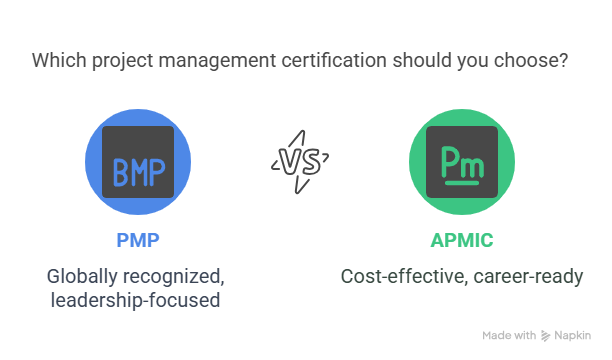Project Management Certification PMP: Everything You Need to Know
The PMP® (Project Management Professional) certification remains the gold standard for project leaders worldwide. Issued by the Project Management Institute (PMI), it validates your ability to lead complex projects, manage teams, and deliver results across time, scope, and cost constraints. But in 2025, PMP is no longer the only option. With the rise of specialized certifications and more affordable, CPD-accredited alternatives like the Advanced Project Management Certification from APMIC, professionals are asking: is PMP still worth it? This guide breaks down everything you need to know before committing.
What Is PMP Certification, and Who Is It For?
The PMP certification is a globally recognized credential designed for mid-to-senior project professionals. It covers five key performance domains: initiating, planning, executing, monitoring/controlling, and closing. It’s built for those leading projects across any industry—IT, healthcare, construction, finance, or government.
To qualify, candidates must meet PMI’s eligibility criteria and pass a 180-question exam. PMP validates not just book knowledge, but real-world application. For this reason, it’s often required for enterprise-level roles or public-sector project contracts.
Certifications like APMIC’s CPD-accredited program offer a similar scope, but with greater accessibility—especially for global learners without PMP prerequisites.
| Eligibility Criteria | PMP | APMIC Advanced |
|---|---|---|
| Education | Bachelor’s degree or equivalent | No formal degree required |
| Experience | 3+ years managing projects | None – open to all levels |
| Exam | Mandatory (180 questions) | Project portfolio + final assessment |
What the PMP Exam Actually Covers
The PMP exam tests your knowledge across three major domains: People, Process, and Business Environment. It blends predictive (Waterfall), agile, and hybrid methodologies, making it highly versatile. Candidates must understand cost control, critical path methods, risk response planning, stakeholder analysis, and team motivation techniques.
It is based on the PMBOK® Guide, but also includes real-world agile content and situational judgment. The exam format:
180 multiple-choice questions
230 minutes to complete
3 scheduled breaks
Includes formulas, scenario-based logic, and team leadership challenges
If you're aiming to specialize in a specific methodology like Agile, an Agile Project Management certification may be more focused. But PMP is ideal for cross-sector, enterprise-level leadership.
PMP vs. APMIC Advanced Certification
PMP is an established brand. APMIC, however, offers flexibility, affordability, and real-world lab scenarios. The APMIC Advanced certification is designed to mirror enterprise project workflows while remaining accessible to professionals in emerging markets or career transitions.
Key differences:
PMP emphasizes standardized global frameworks
APMIC includes sector-specific modules (finance, healthcare, education)
PMP requires years of experience
APMIC offers immediate entry + career path guidance
Professionals seeking certifications with built-in team leadership, risk analysis, and cost modeling often choose APMIC for its practical format and ongoing support.
Which certification path fits YOUR current career stage best?
Thanks for submitting the answer.
Cost, Time, and Career Impact in 2025
PMP certification typically costs $550–$1,200 USD, including exam fees, prep courses, and study guides. It can take 2–6 months to prepare depending on background. The APMIC Advanced Certification offers a more budget-friendly option, with CPD accreditation, over 500 modules, and zero exam stress—ideal for self-paced professionals.
Career-wise, PMP often boosts salaries by 20–25%. But employers are also valuing practical skills, cross-functional experience, and proof of leadership—all of which are emphasized in APMIC’s applied learning framework.
| Metric | PMP | APMIC Advanced |
|---|---|---|
| Cost | $550–$1,200 | Under $400 |
| Time Commitment | 2–6 months | 4–8 weeks (self-paced) |
| Accreditation | PMI | CPD (UK), cross-sector approved |
Which Should You Choose in 2025?
Choose PMP if:
You’re applying for jobs that explicitly require it
You already meet PMI’s eligibility requirements
You want a globally branded credential for leadership roles
Choose APMIC if:
You’re new to project management
You want to build a career-ready portfolio fast
You need a cost-effective, CPD-accredited option
You want flexible specialization (healthcare, education, IT, etc.)
Certifications like APMIC’s Missouri or New York certification guides are tailored to regional demand, helping learners break into public and private sector roles alike.
Frequently Asked Questions
-
Yes—for enterprise or high-stakes project roles. But new alternatives offer similar value at lower cost and greater accessibility.
-
Yes. APMIC is CPD-accredited, employer-verified, and includes real-world scenarios across industries. It's ideal for global and startup environments.
-
No. APMIC is open to beginners and career switchers. No prior experience or degree is required to start.
-
The PMP exam is 230 minutes long, covering 180 questions. Most candidates use prep courses and simulation tests. PMP-aligned guides like this one are critical.
-
Absolutely. Many professionals use APMIC to gain confidence, then pursue PMP later once they meet the eligibility requirements.


